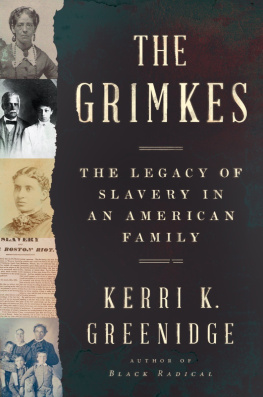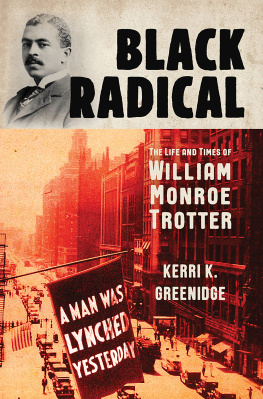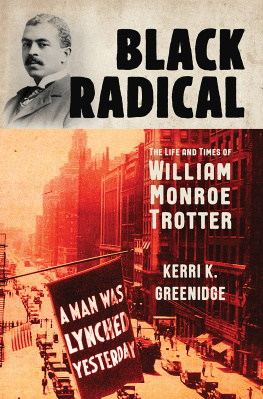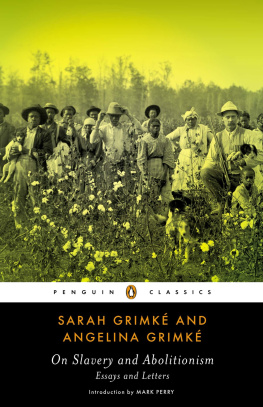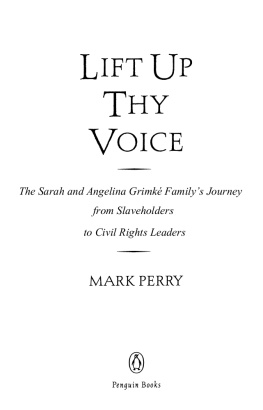
THE
GRIMKES

THE LEGACY OF SLAVERY
IN AN
AMERICAN FAMILY

KERRI K. GREENIDGE

Liveright Publishing Corporation
A Division of W.W. Norton & Company
Celebrating a Century of Independent Publishing
For Katia, Sophia, Hunter, Mavis
Angelina Nana Weld Grimke (18801958): Daughter of Archibald Grimke and Sarah Stanley Grimke; niece to Charlotte Forten Grimke and Francis James Grimke. Known as Nana, she was one of the most prolific Black women writers of the early twentieth century. Her 1917 play Rachel was one of the first written and produced by a Black woman.
Archibald Archie Henry Grimke (18491930): First son of Henry F. Grimke, wealthy Charleston lawyer and slaveholder, and Nancy Weston, who was enslaved to the Grimke family. Father to Angelina Weld Grimke and husband to Sarah Stanley. He graduated from Harvard Law School in 1874 in the same class as future senator Henry Cabot Lodge. An attorney and American consul to Santo Domingo (also known as the Dominican Republic), he eventually led the Washington, DC, branch of the NAACP (19131924) after years as superintendent of Massachusetts Westborough State Hospital.
Charlotte Lottie Forten Grimke (18371914): Granddaughter of Philadelphia sailmaker and abolitionist James Forten and wife to Francis James Grimke. She was the first Black woman graduate of Salem State Normal School in Massachusetts, a teacher in the South Carolina Sea Islands during the Civil War, and the first Black woman published in the Atlantic Monthly.
E. Montague Grimke (18321896): Oldest son of Henry F. Grimke, wealthy Charleston lawyer and slaveholder, and his first wife, Selina Sarah Simmons. Half-brother to Archibald, Francis, and John Grimke. He fought for the Confederacy and became a prosperous Charleston merchant after the war.
Francis Frank James Grimke (18501937): Second son of Henry F. Grimke and Nancy Weston. Husband to Charlotte Forten. He graduated from Princeton Theological Seminary. He was pastor of the exclusive Fifteenth Street Presbyterian Church (est. 1841) in Washington, DC.
Henry Grimke (18011852): Son of John Faucheraud Grimke (17521819) and Mary Smith Grimke (17541839), brother of the abolitionist sisters Sarah and Angelina Grimke. Lawyer and slaveholder, he had three sonsArchibald, Francis, and Johnwith the enslaved woman Nancy Weston. He also had three surviving children with his white wife, Selina Sarah Simmons.
John Grimke (18521915): Third son of Henry F. Grimke and Nancy Weston. Attended Lincoln University in Pennsylvania alongside his brothers. During the 1880s, he became estranged from the family and lived variously in Florida, New York, and Maryland.
Sarah Moore Grimke (17921873): Abolitionist and womens rights activist, she converted to Quakerism and helped found the Philadelphia Female Anti-Slavery Society in 1831. Like her sister, Angelina, she wrote some of the most influential abolitionist texts of the time, including Letters on the Equality of the Sexes and the Condition of Women (1838).
Sarah Stanley Grimke (18501898): Archibald Grimkes wife (m. 1879) and Angelina Weld Grimkes mother.
Thomas Smith Grimke (18341907): Henry Grimkes youngest son, born to his white wife, Selina Sarah Simmons. Half-brother to Archibald, Francis, and John Grimke.
Angelina Nana Grimke Hamilton (18721947): Daughter of Sarah Grimke Weld Hamilton and William Hamilton; granddaughter of Angelina Grimke and Theodore Dwight Weld. Referred to as Nana or Nina, she became one of only a handful of women to receive a doctorate in medicine from the University of Michigan in 1908.
Sarah Sissie Grimke Weld Hamilton (18441899): Daughter of Angelina Grimke Weld and Theodore Dwight Weld; cousin to Archibald, Francis, and John Grimke.
Angelina Grimke Weld (18051879): Abolitionist and womens rights activist and author of two landmark works of the radical abolition movement: Appeal to the Christian Women of the South (1836) and Appeal to the Women of the Nominally Free States (1837). She was called Nana and Nina as a child. Wife of Theodore Dwight Weld. Aunt to Archibald, Francis, and John Grimke.
Charles Stuart Weld (18391901): Oldest son of Angelina Grimke and Theodore Dwight Weld and cousin of Archibald, Francis, and John Grimke. He went by his middle name, Stuart, for most of his childhood and adolescence.
Theodore Dwight Weld (18031895): Angelina Grimkes husband and uncle to Archibald, Francis, and John Grimke. He was a radical abolitionist who published American Slavery as It Is: Testimony of a Thousand Witnesses (1839).
Theodore Sodie Grimke Weld (18411917): Angelina Grimke Weld and Theodore Dwight Welds youngest son, called Sodie. He suffered from mental illness and spent the last twenty years of his life at Westborough State Hospital in Massachusetts.
Nancy Weston (c. 18101895): Mother of Archibald, Francis, and John Grimke; enslaved to the Grimke family and the common law wife of Henry F. Grimke.

A s a terrible heat wave spread across New England in July 1911, a federal express train snaked its way up the Atlantic coast on the New York, New Haven, and Hartford line. It left Union Station in Washington, DC, bound for Boston, where the heat was so oppressive that wilted citizens slept in the citys Common between Tremont and Beacon Streets and anxious mothers stayed up all night walking their infants up and down tenement sidewalks strewn with mattresses and pillows: they were afraid their babies would fall asleep, overheat, and not wake up with the sunrise.
With the train barrelling toward Connecticut, over one hour behind schedule, Angelina Weld Grimke tried anything she could to keep cool in the Pullman car. She wore only a light kimono and slept bare on her mattress, arms dangling through the narrow window so that the breeze from the passing countryside could counteract the sweat pouring from every surface of her body. She had taken this trip from the District of Columbia to Boston
As the train approached Bridgeport, Connecticut, a loud crash and the sound of screeching brakes jolted her awake. People screamed and glass shattered, while her Pullman car jumped the track and lurched down a twenty-foot embankment. Twelve people died and forty-four were wounded. Angelina Weld Grimke was one of the luckier ones, even though her back was broken and her luggage lost: all of her clothes, money, and personal papers muddled with the rest of the debris at the bottom of the Bridgeport embankment. Her long recovery would begin at the local hospital. Some of the dead had been so badly mutilated that it took weeks for family members to identify their remains.
News of the train crash and Angelinas near death spread like wildfire through the colored elite, the small yet influential class of Black people whose educations, family history, and relative economic stability tasked them with developing the Best of this race that they may guide the Mass away from the contamination and death of the Worst.elite for some time. He and his brother, the Washington Presbyterian minister, Francis James Grimke (called Frank), first arrived at the Boston offices of the New England Freedmans Aid Society in 1866.
Next page
